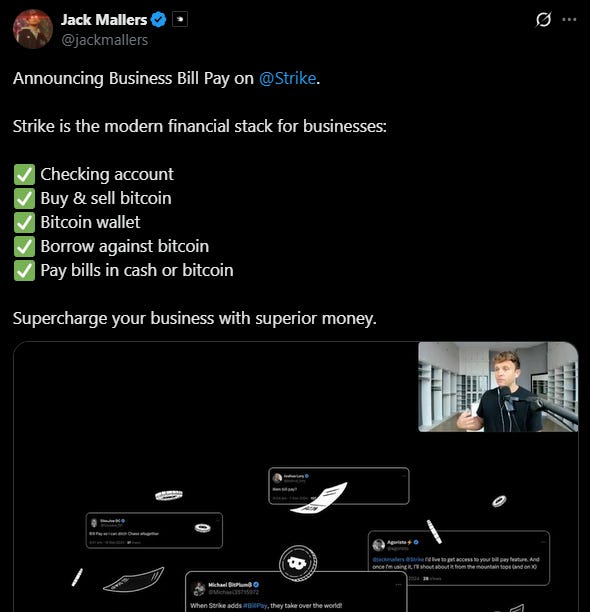Ten31 Timestamp 909,295
The market largely shook off last week’s poor economic data and President Trump giving The Apprentice treatment to the head of the BLS, as all major equity indices closed higher and the Nasdaq posted yet another all-time high. Meanwhile, it was a week of concerning headlines for those fading the prospects of a Strategic Bitcoin Reserve, with new reports indicating the federal government is taking meaningful steps to finally bring Fannie Mae and Freddie Mac out of conservatorship in an IPO that could value the entities at over $500 billion. Traders have been salivating over this concept for well over a decade, so the latest discussions could easily end up in yet another rugpull, but President Trump has explicitly endorsed the idea several times, and a successful offering (potentially followed by ongoing monetization of the government’s stake) would be an interestingly timed source of funds for “budget-neutral” pursuit of national strategic priorities. Perhaps even more notably, the Federal Reserve quietly published a memo surveying the mechanics and track record of official gold revaluations by various governments over the last several decades, the Fed’s first ever published work on this kind of maneuver. In the case of the United States, which still officially values its gold at the legacy $42/oz mark from 1971, a revaluation would add nearly $900 billion to the Treasury Department’s coffers at current gold prices, a potentially significant one-time liquidity injection that would require no new taxes or federal spending cuts. This kind of accounting alchemy might need some additional window dressing to gain technical “budget-neutral” qualification from the CBO (and Treasury Secretary Scott Bessent has previously stated this isn’t a plan his department is currently pursuing), but it’s exactly the kind of rabbit we’d expect the federal government to pull out of the fiat hat if they’re interested in augmenting their holdings of the scarcest asset on the planet. With President Trump nominating Stephen Miran – chief architect of his trade reset plan – to the recently vacated post on the Fed’s Board of Governors, Jerome Powell slowly exiting stage left, and major institutions initiating large bitcoin positions, we continue think all the chess pieces are slowly moving into place for the orange coin to become entrenched as a geopolitically relevant asset over the next few years.
Portfolio Company Spotlight
AnchorWatch is a first of its kind bitcoin self-custody insurance provider offering true 1:1 coverage through its innovative, proprietary vault technology and backing from Lloyd’s of London, a dramatic step up from the fractional insurance coverage offered by most traditional custodians. The company’s Trident Vault platform leverages bitcoin’s native properties to offer bitcoin holders and fiduciaries an intuitive, enterprise-grade collaborative custody solution that enables highly composable and dynamic custody schemes, all with the backing of regulated, blue-chip insurance products that further mitigate risks of theft, key mismanagement, natural disasters, and more. Trident Vault, which integrates with many popular bitcoin signing devices, was designed with distributed teams and complex workflows in mind, and AnchorWatch’s embedded insurance offerings are set to unlock further bitcoin adoption among high net worth customers, enterprises, and institutions of all sizes.
As the world’s largest investor focused entirely on bitcoin, Ten31 has deployed $200 million across two funds into more than 30 of the most promising and innovative companies in the ecosystem, and we expect 2025 to be the best year yet for both bitcoin and our portfolio. Visit ten31.xyz/invest to learn more and get in touch to discuss participating.
Selected Portfolio News
Strike launched a handful of new features this week, including business bill pay:
As well as AUD loans and balances:
And the rollout of bitcoin-backed lending in Missouri:
Maple AI added support for OpenAI’s just-released GPT-OSS model:
Media
AnchorWatch Co-Founders Rob Hamilton and Becca Rubenfeld joined the Investor’s Podcast to dig into the differentiation of AnchorWatch’s insured bitcoin custody offering.
Debifi and HodlHodl Founder Max Kei appeared on the Bitcoin Archive podcast to discuss the evolution of bitcoin-backed lending.
Ten31 Principal John Arnold joined Managing Partner Matt Odell on Citadel Dispatch for a quarterly update on key trends in the space.
Market Updates
President Trump took to CNBC this week for a wide-ranging interview, partially to manage the optics of his removal of the head of the BLS last week, but also to suggest his nominee for Jerome Powell’s replacement should be announced shortly. Contrary to some recent speculation (including by this newsletter), the President indicated that Treasury Secretary Scott Bessent does not want the job.
Instead, the latest reports point to current Fed Governor Christopher Waller – notably one of the two dissenting votes from last month’s Fed Funds Rate decision – emerging as the likely frontrunner to replace Powell.
In a somewhat unexpected move, the President selected Stephen Miran to fill the vacant seat of former Fed Governor Adriana Kugler, who abruptly resigned last week. Miran, who previously served as head of the Council of Economic Advisors, is the author of a 2024 paper outlining various unconventional ways to “restructure” international trade and capital flows that has apparently informed much of the White House’s strategy this year.
Of note, Miran’s paper explicitly cites “gold and cryptocurrencies” as potential beneficiaries of a major shift in the trade paradigm. (He has also been caught tweeting pro-bitcoin memes.)
In a potentially major signpost, the Fed published an article this week reviewing prior historical instances of governments revaluing their gold holdings from official accounting marks as a means of adding budget flexibility or mitigating high debt burdens.
While the paper was released with no fanfare or promotion, to our knowledge this marks the first time the Fed has officially acknowledged or addressed this concept, which at the current gold price could add close to $900 billion of budget flexibility to the Treasury General Account with no new taxes or spending cuts.
Treasury Secretary Scott Bessent has previously indicated that this kind of accounting maneuver is not something he is currently considering, and as we know, you should never believe anything in politics until it is officially denied.
Coincidentally, this week also saw a spike in gold prices on guidance from the Trump administration that gold bars out of Switzerland would be subject to a 39% tariff, potentially a major impediment to physical gold delivery to settle outstanding futures contracts. Gold prices briefly broke $3,500/oz on the headlines, good for a new all-time high.
The news ignited a scramble for physical gold until the administration indicated on Friday afternoon that the report was “misinformation” and that more clarity around the tariff rules will be issued soon – though if you were contemplating an unexpected gold revaluation, a sudden and severe short squeeze probably wouldn’t be totally unwelcome.
Elsewhere in potential budget-neutral sources of capital, multiple reports indicated this week that President Trump has been meeting with major bank executives to hear pitches on an IPO of government-sponsored mortgage financing giants Fannie Mae and Freddie Mac, which have been in federal conservatorship since 2008.
The Wall Street Journal then reported that the IPO is targeting a $30 billion raise for the government in a deal that would value the companies at more than $500 billion, which would represent one of the largest public offerings in history.
As rumored several weeks ago, President Trump officially signed an executive order this week to pave the way for 401k investment plans to allocate funds to bitcoin and other digital assets, as well as private equity funds.
It was a quieter week on the macro front, though the latest ISM Services data echoed the major theme from last week, with lower than expected results on everything except for prices paid.
On the trade side, President Trump announced much higher tariffs on semiconductors (though with a variety of notable exemptions that make the teeth of these measures somewhat questionable) and an escalation of tensions with India while pushing back on the potential for courts to overturn his tariff authority.
Meanwhile, China has continued to ramp up its throttling of critical rare earth minerals needed for defense and technology supply chains, which we expect to drive further federal forays into outright industrial policy similar to last month’s MP Materials deal.
Regulatory Update
Tornado Cash co-founder Roman Storm was found guilty of unlicensed money transmission this week, while the jury did not reach a decision on the other two charges. The verdict, in conjunction with the Samourai Wallet plea arrangement from last week, may set problematic precedents that will hopefully be at least partially mitigated by favorable language in the CLARITY Act.
At a digital assets industry conference this week, SEC Commissioner Hester Peirce delivered a sharp critique of applications of the Bank Secrecy Act to noncustodial, peer to peer technologies, arguing (in a refreshing change of pace for a financial services regulator) that the fundamental right to privacy should not be cavalierly dismissed by government agencies.
President Trump signed an executive order to penalize banks that engage in politically motivated de-banking of clients.
In a similar vein, White House Crypto and AI Czar David Sacks publicly berated brokerage platforms like Vanguard for still not allowing clients to access bitcoin ETFs.
Noteworthy
Several major institutions reported new or increased positions in bitcoin ETFs this week, including Michigan’s state pension fund, which increased its existing position several times over, and a large Hong Kong fund that disclosed initiating a $90 million+ position. Brown University’s endowment also doubled its position in IBIT.
But most notably, Harvard University’s massive and highly-respected endowment reported an IBIT position of over $116 million, the first such disclosure from the fund.
This position makes Harvard the 29th largest publicly disclosed holder of the ETF, and interestingly also coincides with the endowment’s first disclosure of a $100 million+ gold ETF position.
Following a brief lull earlier in the summer, bitcoin’s total network hashrate has been on a heater in the last month, consistently pushing to new all-time highs above one zettahash, or one sextillion hashes per second.
Travel
Bitcoin Park Imagine IF Summit, Sep 19-20
Portfolio Company Retreat, early October






